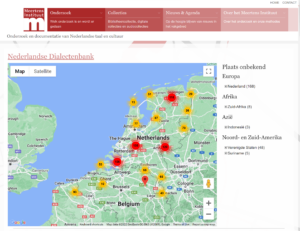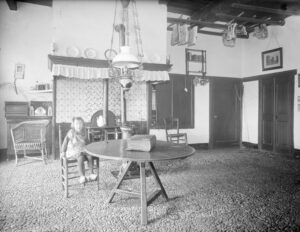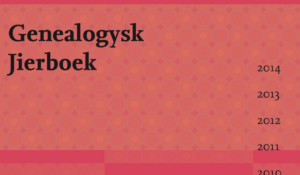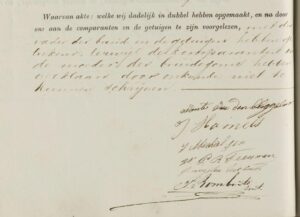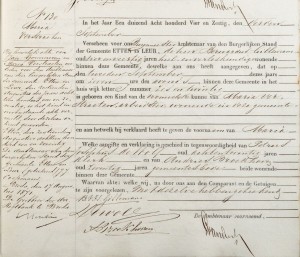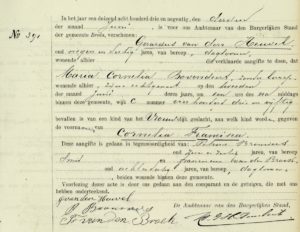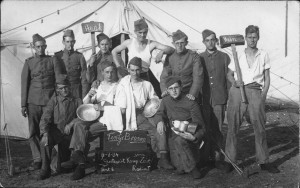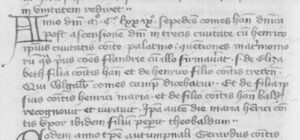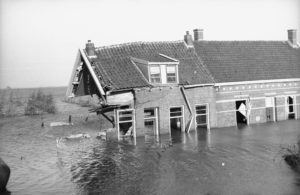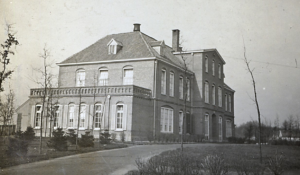In the Netherlands, every region, sometimes every town, has its own particular dialect. If you want to hear how the people in your ancestors' region sounded, you can listen to audio clips at the Meertens Institute website. Click on the + before the province Click on the name of the town, which will open a pop-up with a list of recordings. Click on "Afspelen" [play] Most of the clips are anonymous. You can also click Kaart [map] to see the recordings on a map or click the Opnames … [Read more...]
Quick tip – Look at old photos
Looking at old photos can tell you a lot about life in the times of your ancestors, even if the photos were not of your family. Take this photo of an unidentified Winterswijk farm in 1937, for example. Since I am related to just about everyone from Winterswijk, the child in the photo is probably a distant cousin of mine. We can see that the she is wearing long stockings above her wooden shoes, telling us the photo was probably taken in winter. She is sitting on a wooden chair with a … [Read more...]
Quick tip – Frisian genealogy yearbooks online
The Genealogysk Jierboek [Genealogical Yearbook] is a publication about Frisian genealogy. The issues from 1951 to 2020 are online. The articles are in Dutch or Frisian. … [Read more...]
Quick tip – Signatures in Civil Registration Records
If you are looking at a civil registration record, the last part will identify who signed the record. If any of the people were illiterate or had other reasons not to sign, it would say so. Example: Biggelaar-Rens marriage record On 1 May 1858, my ancestors Hubertus van den Biggelaar and Anna Maria Rens were married in Terheijden. The bottom of their marriage record described who signed the record. It was signed (translation) "with the father of the bride and the witnesses, while the parties … [Read more...]
Quick tip – Snap shot or Video?
When you are looking at a record, ask yourself: was this record created all in one sitting? Or was this amended and updated over time? There are different types of records that were changed and updated over a longer period of time. In population registers, people who moved out or died were crossed out, and people who moved in or were born were added. In some types of tax or tithe records, owners of real estate would be updated if the property changed hands. In cadastral ledgers, plots that … [Read more...]
Quick tip – Witnesses are often not indexed
If you are using indexes of genealogical records, please keep in mind that the witnesses were often not indexed; only the main parties were. You can consult the original record to find the rest of the information. Knowing the witnesses is helpful since they may hold the vital clue to solving your brick walls. … [Read more...]
Dutch term – Groot verlof
Groot verlof means "grand leave." It is a term you may see in military records. Conscripts spent part of their military service in training and the rest on grand leave. Men on grand leave were still formally in the army though, and if they emigrated before they were discharged, they would be considered deserters. … [Read more...]
Quick tip – Old does not mean original
When you are working with old manuscripts, it is tempting to think they are original records—the first recorded version of the document. However, even old manuscripts may be derivative records—copies, transcriptions, or abstract of older versions. Sometimes, the original record does not survive and the derivative is all we have to work with. But we have to keep in mind that it may have copy or interpretation errors. In the past, when people created a copy, they may not necessarily have tried … [Read more...]
Quick tip – List of Historical Disasters in the Netherlands
Philip van Diemen de Jel and Irene Walstra have a list on their website with Historical Disasters in the Netherlands (in Dutch and English). This list is useful if you see an unexpected cluster of deaths in your family. Since Dutch death records do not list a cause of death, it can be hard to find out how an ancestor died. Knowing there was a epidemic, bombing, or flood in the area can help you find out what may have happened. See also other tips for how to find a cause of death. … [Read more...]
Quick tip – Was your relative in an asylum?
Here are a couple of ways you may find out that your relative was in an asylum: Asylum records. Some of these are digitized or indexed. You may stumble upon these records by searching. Death records, where the informant was an employee of the asylum, or the place of death is an asylum. Research the address if someone died away from home. Marriage supplements of children, if the person was unable to consent to their children's marriage because of their mental state. Court records, … [Read more...]
